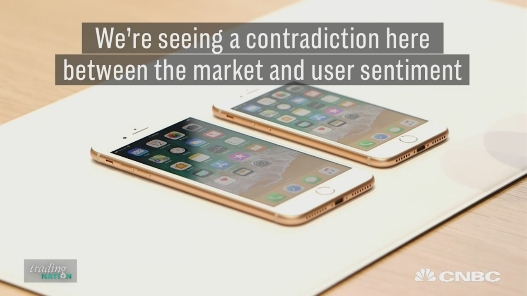 2334
2334
 2017-10-19
2017-10-19
Apple has gone from hot to not. After leading the market this year, the stock has fallen nearly 1 percent since it unveiled its next generation of iPhones, while the Dow Jones industrial average has risen more than 4 percent in the same time. And one economist has identified an emerging trend that could signal more trouble for the stock.

"We're starting to see something a little bit concerning to us. Analysts are raising their price targets. But the reception for the iPhone 8 and the iOS 11, the operating system, looks less than exciting. And the delays on the iPhone X, the new phone, look major. So we're worried that some of the best-laid plans here are not really going to come to pass," Max Wolff, chief economist at Disruptive Technology Advisers, said Tuesday on CNBC's "Trading Nation."
Furthermore, the iPhone 8 is "even less impressive to a lot of users" than the iPhone 7 proved to be, Wolff said. He fears that the price of the phone, along with some technical issues that have cropped up, means the iPhone won't be as appealing to consumers.
"What we're starting to see is people interested in buying the [iPhone] 7 instead of the 8 because it's pretty similar and it's even cheaper, and there are some problem with the operating system," he said of the latest phone model.
Meanwhile, the price of the newest iPhone model is precisely what prompted an analyst at KeyBanc Capital Markets to raise the firm's rating on the stock on Monday.
KeyBanc analyst Andy Hargreaves wrote in a report that the rollout of the more expensive iPhone X model will boost profits, and raised KeyBanc's rating on the stock to overweight from sector weight.
The firm also established a price target in the same note to clients of $187 per share, implying 16.5 percent upside from the stock's closing price on Tuesday.
Shares of Apple have gained more than 39 percent this year, and rose modestly in Tuesday trading.
Source: techcrunch